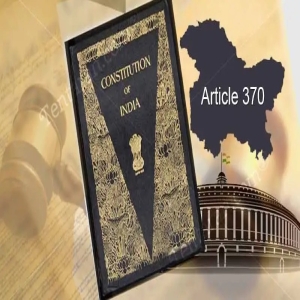
.jpg) Aakash
Aakash

The State of Jammu and Kashmir was provisioned with a special constitutional status by Article 370 of the Indian Constitution. The Article granted substantially more autonomy to the State when compared with others. It was abrogated in 2019 through two Constitution Orders (CO), 272 and 273, issued by President Ram Nath Kovind.
Clause (3) of the Article provides the authority to revoke it, stipulating that "the President can, by public notification, declare that this article shall cease to be operative on the recommendation of the Constituent Assembly of the State."
A careful reading of the Article would reveal that it is outside the power of a presidential order to directly amend it. To rectify this, the first order was issued on August 5. Article 367 was first amended to replace the Sadar-i-Riyasat with the governor. Given the dissolution of the Constituent Assembly in Jammu and Kashmir in 1957, CO 272 substitutes it with the approval of the State's legislative assembly, allowing for the amendment of Article 370.
Since the State was already under the President's Rule, the Parliament assumed the power of the Legislative Assembly, thereby bypassing the recommendation of the constituent assembly mandated by the Article. Within a few hours of the proclamation of CO 272, the Rajya Sabha moved a recommendation for the abrogation of the Article.
The second order, CO 273, issued the next day on August 6, abrogated the Article based on the recommendation of the Rajya Sabha, fully integrating Jammu and Kashmir into the Indian Union. The first clause was reformulated to extend the powers over the whole State, and the rest ceased to exist.
The Parliament then passed the Jammu and Kashmir Reorganisation Act 2019 on August 9, cleaving the State into the two Union Territories of Jammu and Kashmir and Ladakh.
The government's actions invoked a cascade of petitions challenging the constitutionality of the dissolution of Article 370 and the disregard of Article 3 in downgrading the status of a state.
The petitioners challenged the acts on multiple points. The "temporary" status of the Article was not literal. It only denoted the powers subsisting with the Constituent Assembly until a Constitution was enacted, after which all the powers would rest within the Constitution. It is backed by Article 147 of the Jammu and Kashmir Constitution, which states that no bills that seek to change the relationship of the State with the Union may be introduced in either house of the legislature. Furthermore, an interpretative provision was used for the amendment rather than Article 368, which enables the Constitutional amendment. The Rajya Sabha also cannot assume the powers of the governor. Article 356 only empowers the Parliament to assume those powers which belong to the state legislature.
Kapil Sibal argued that "if you in principle say that Parliament can invert itself into a Constituent Assembly, then where do we go from there? Forget about this case; I am far more worried about our future."
It would be helpful to have some historical context here to put things in perspective. After India gained independence, Jammu and Kashmir and 562 states regained sovereign status, with the option to join either dominions or remain independent, guided by the people's will and geographic considerations. The option was not legally binding on princely states.
Following independence, all states, except Hyderabad, Junagadh, and Kashmir, promptly acceded to one of the dominions. All these three states suffered from the same problem. The rulers followed a different religion than the majority of the State.
After a period of indecision, during which Maharaja Hari Singh hesitated due to concerns about losing privileges, external pressures, particularly a tribal siege backed by Pakistan, compelled him to sign the Instrument of Accession. The clauses of the IoA allowed the Indian Parliament powers to legislate only over 3 subjects - defence, external affairs and communication. He wanted to retain the power to enter into agreements with the Indian Government at his discretion. This is reflected in the text of Article 370.
Critiques of Article 370 contend that the State's accession to India in 1947 was unconditional and that the special status granted by Article 370 was unnecessary. However, it would be essential to note that Article 370 was incorporated before the adoption of the Constitution on November 26, 1949.
Ultimately, the Constituent Assembly of Jammu and Kashmir drafted the Constitution of Jammu and Kashmir, affirming the State's integral status within India while preserving the special provisions granted by Article 370. Additionally, it prohibited any future Legislative Assembly from tampering with the constitutional relationship between the State and the Union.
Despite the popular opinion, various governments had already diluted the Article over the years, starting with Nehru, who was keen on integrating the formerly princely State with the rest of the country. As in other states, most Constitutional provisions were already applied to it. Interestingly, special status has also been conferred to other states, so rhetoric fails to achieve its intended goal. Therefore, the Article's dissolution has been more symbolic than practical.
Meanwhile, the government, notorious for delaying various other matters, was too expedient, raising questions about its intentions. A pattern may be found in the different vital legislations that it has passed. Eluding scrutiny is the norm now. Only 25% of the bills tabled in the 16th Lok Sabha were passed off to the committees for study compared to 71% previously. Are we again seeing the results of an experiment cooked up in the labs of the saffron wing? This model may soon be applied in other states which enjoy special statuses. Who knows what the next experiment will be? Who will be the guinea pig to squeal in suffering, delighting the unscrupulous elements that wish to destroy the very foundations of the nation?